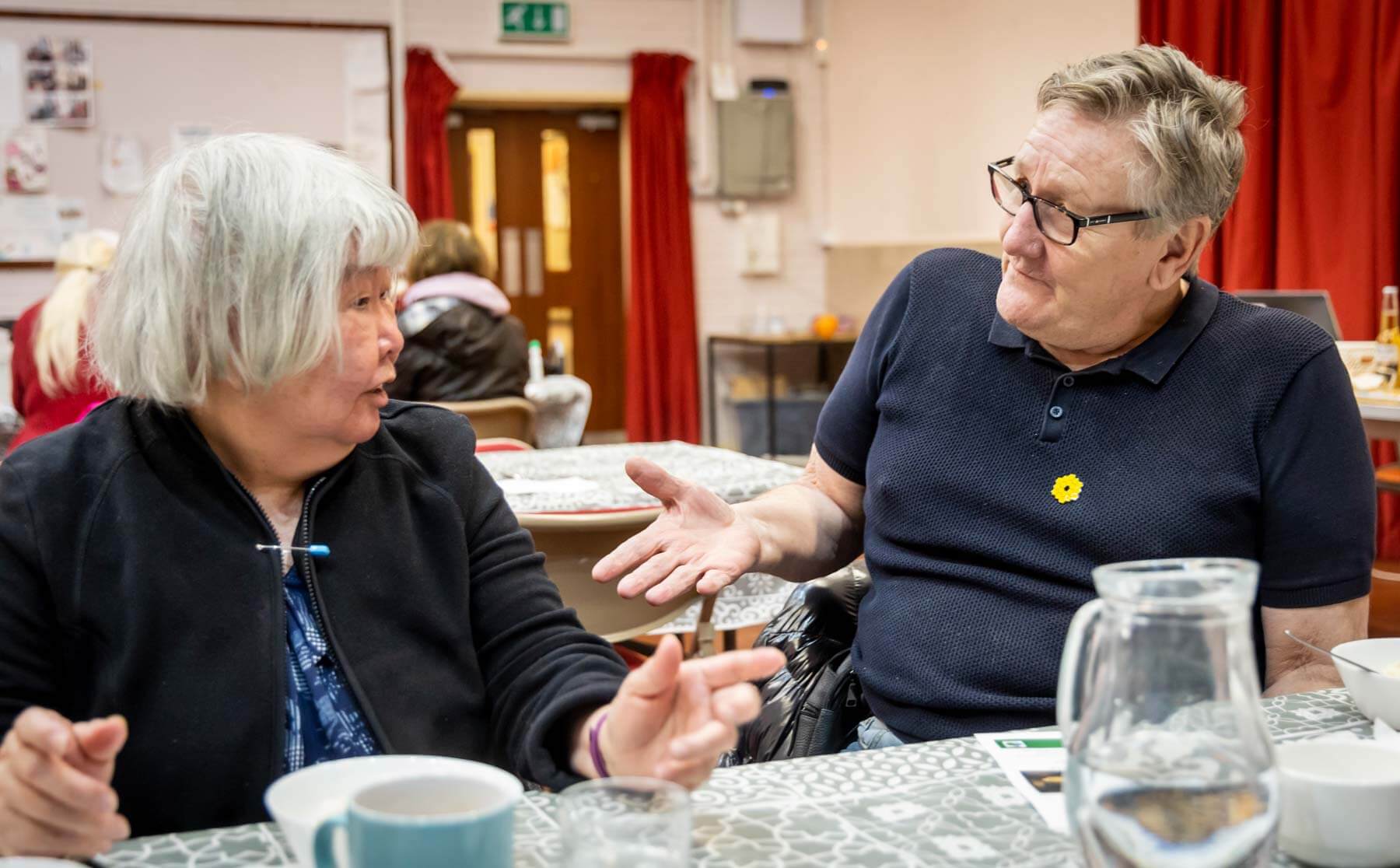Living with chronic conditions affects our entire lives; we might need accommodations at work, or when we travel or shop, or gather with our friends. We need good communication to manage all this and help others to understand how they can help and support us. We need good communication to understand how our condition affects our loved ones and caregivers, too. Without good communication skills, living with a chronic health condition can become even more difficult.
To improve our communication skills, we learn how to express ourselves assertively and listen with empathy. Assertive communication is the middle ground between aggression and passivity. It means clearly stating how we feel, what we want, and what we need, while accepting and respecting the fact that others have their own feelings, wants, and needs, too. An assertive person does not insist on having things their own way, but also does not negate their own rights by always going along with the other person. An assertive person uses “I messages.” The “I message” allows us to express concerns or feelings, such as anger, frustration, or fear in a constructive way without blowing up, seeming to blame others, or causing defensiveness in others. A “you message,” on the other hand, tends to do the opposite and blocks further communication.
Let’s imagine your condition has made it harder for you to get ready and be on time for commitments. Your partner might give a “you message” by saying, “Hurry up! You’re always late!” Or they might use an “I message” to express their feelings or concerns in a constructive way, and make requests to get their needs met. “It’s time to go and I’m afraid our friends are going to leave without us. Are you almost ready? Being on time is important to me. I would love to think together about how we can give you the time you need to prepare to go out and still be on time.”
Or let’s imagine that you want to ask your children to include you more often on their weekend outings. A “you message” might sound like, “You are selfish about your weekends when you don’t include me. I know you don’t think I am able to get around, but you are wrong.” Whereas an “I message” might sound like, “I have been taking a class on balance and working hard on getting more steady on my feet, so I can sometimes join you on your weekend excursions. I am feeling determined to get outside with my family more and do more activities and challenge myself. I would love it if you would invite me along one weekend.”
Being assertive builds self-esteem and self-confidence. It increases our sense of control and reduces feelings of helplessness. It helps us ask for, accept, and receive help. Even more challenging sometimes, empathetic listening requires us to focus our attention on the other and what they feel and need without judgment. Listening empathetically helps us to create deeper connections, grasp what is going on, and negotiate compromises. Sometimes we fail to express our feelings and needs out of fear of rejection or disapproval by others, fear of appearing too demanding, confusing assertiveness with aggressiveness, or expecting others to read our minds. Sometimes, we simply don’t have the skills.
LifePath’s Healthy Living Program invites you to start/continue your study of these skills by joining us for our fall 2023 workshops and August’s “Wellness Unplugged” seminar series: “Assertive Communication” with Karen Fogliatti, Monday, August 28, from 10 – 11:30 a.m.
As well as our monthly seminars, our workshops help people with chronic conditions and their caregivers learn a wide array of skills to better manage their conditions and improve their quality of life. Sign up for one or more of our fall workshops listed below, or an upcoming “Wellness Unplugged” seminar.
LifePath’s Healthy Living Fall 2023 Workshops:
FREE Workshops you can access in person, on your computer OR your phone!
-
Living Well with Long-Term Health Conditions (In Person):
Techniques to improve symptoms of chronic conditions such as healthy eating, relaxation techniques, communicating, goal-setting, problem solving, and more.
Mondays, October 2–November 14, 2–4:30 p.m.
-
A Matter of Balance–Managing Concerns About Falls (In Person at The Senior Center, Shelburne Falls):
Teaches practical strategies to reduce the fear of falling and explores medical, behavioral, and environmental risk factors for falls, while stressing the importance of developing an exercise plan.
Fridays, September 1–November 4, 10 a.m.–12 p.m. -
Living Well with Persistent Pain (Live Video Conference):
Provides information and practical skills that build self-confidence and help participants assume an active role in managing problems specific to chronic pain, including fatigue, frustration, and poor sleep.
Tuesdays, October 3–November 14, 6–8:30 p.m. -
Healthy Eating for Successful Aging (Live Video Conference):
For adults hoping to improve their nutrition in order to lose/gain weight, lower cholesterol, manage blood sugar levels, or live well with any chronic condition, this workshop teaches the “My Plate” guidelines, nutrition basics, label reading, meal planning, goal-setting, and problem solving.
Wednesdays, October 4–November 15, 3–5 p.m. -
UCLA Memory Training (In Person at the Greenfield Senior Center):
For people with mild age-related memory challenges, Memory Training teaches memory enhancing techniques and practical strategies to boost memory functioning.
Wednesdays, October 4–October 25, 10 a.m.–12 p.m.
For more information or to register, contact Andi Waisman, Healthy Living Program Manager, at 413-773-5555 x2297, 978-544-2259 x2297, or awaisman@LifePathMA.org, or visit the Healthy Living Workshops page.






